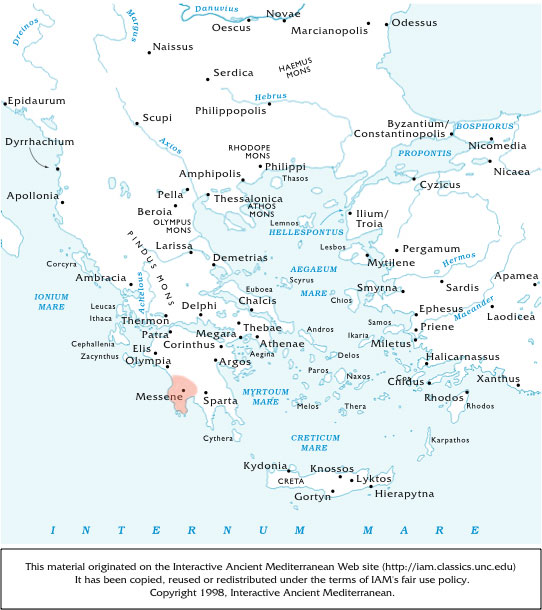A country in Peloponnesus, bounded on the east by Laconia, from which it was separated by Mount Taygetus, on the north by Elis and Arcadia, and on the south and west by the sea. In the Homeric times the western part of the country belonged to the Neleid princes of Pylos, of whom Nestor was the most celebrated; and the eastern to the Lacedaemonian monarchy. On the conquest of Peloponnesus by the Dorians, Messenia fell to the share of Cresphontes, who became king of the whole country.Messenia was more fertile than Laconia; and the Spartans soon coveted the territory of their brother-Dorians; and thus war broke out between the two people. The First Messenian War lasted twenty years, B.C. 743-723; and notwithstanding the gallant resistance of the Messenian king, Aristodemus, the Messenians were obliged to submit to the Spartans after the capture of their fortress Ithomé. After bearing the yoke thirtyeight years, the Messenians again took up arms under their heroic leader, Aristomenes. The Second Messenian War lasted seventeen years, B.C. 685-668, and terminated with the conquest of Ira and the complete subjugation of the country. Most of the Messenians emigrated to foreign countries, and those who remained behind were reduced to the condition of Helots or serfs. In this state they remained till 464, when the Messenians and other Helots took advantage of the devastation occasioned by the great earthquake at Sparta to rise against their oppressors. This Third Messenian War lasted ten years (464- 455), and ended by the Messenians surrendering Ithome to the Spartans on condition of being allowed a free departure from Peloponnesus.
When the supremacy of Sparta was overthrown by the battle of Leuctra, Epaminondas collected the Messenian exiles, and founded the town of Messené (B.C. 369), at the foot of Mount Ithomé, which formed the acropolis of the city. Messené was made the capital of the country. Messenia was never again subdued by the Spartans, and it maintained its independence till the conquest of the Achaeans and the rest of Greece by the Romans (B.C. 146). See Niese, Die älteste Geschichte Messeniens (1891). (Harpers Dictionary of Classical Antiquities, 1898)
